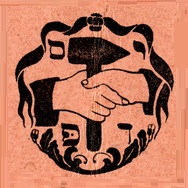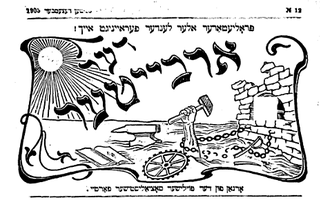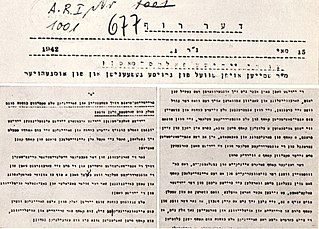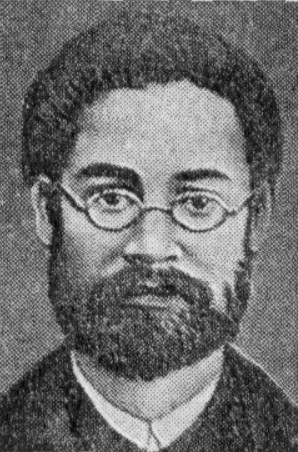The Social Democratic Party of Lithuania is a centre-left and social democratic political party in Lithuania. Founded as an underground Marxist organisation in 1896, it is the oldest extant party in Lithuania. During the time of the Soviet Union, the party went into exile, emerging once again in Republic of Lithuania in 1989.
An ethnic party is a political party that overtly presents itself as the champion of one ethnic group or sets of ethnic groups. Ethnic parties make such representation central to their voter mobilization strategy. An alternate designation is 'Political parties of minorities', but they should not be mistaken with regionalist or separatist parties, whose purpose is territorial autonomy.

The Social Democracy of the Kingdom of Poland and Lithuania, originally the Social Democracy of the Kingdom of Poland (SDKP), was a Marxist political party founded in 1893 and later served as an autonomous section of the Russian Social Democratic Labour Party. It later merged into the Communist Workers Party of Poland. Its most famous member was Rosa Luxemburg.

The Jewish Social Democratic Party in Galicia was a political party in Galicia and later also Bukovina, established in a split from the Polish Social Democratic Party of Galicia (PPSD) in 1905. The party made its first public appearance on May 1, 1905, with separate May Day rallies in Kraków, Lemberg, Tarnów and Przemyśl. However, as the new party stressed that it was not a competitor of the existing Social Democratic parties, they later joined the PPSD celebrations.
The German Socialist Labour Party of Poland was a political party organizing German Social Democrats in interbellum Poland.

The Social Democratic Bund, or the General Jewish Labour Bund, the Bund (S.D.) or, later, the "Bund" in the Soviet Union, was a short-lived Jewish political party in Soviet Russia. It was formed as the Russian Bund was split at its conference in Gomel in April 1920. The Social Democratic Bund was formed out of the right-wing minority section of the erstwhile Russian Bund. The party was led by Raphael Abramovitch. After 1923, it continued to exist in exile.

The General Jewish Labour Bund in Romania was a Jewish socialist party in Romania, adhering to the political line of the General Jewish Labour Bund. Founded in 1922, shortly after the establishment of Greater Romania, it united Jewish socialists in Bukovina, Bessarabia and the Romanian Old Kingdom. Standing for the lay wing of the Jewish representative movement, the Romanian Bund had atheistic leanings and offered an alternative to the mainstream Jewish organization. Like other Bundist groups, but unlike the Marxist-inspired Poale Zion bodies of Bessarabia, it rejected Zionism.

The General Jewish Labour Bund in Poland was a Jewish socialist party in Poland which promoted the political, cultural and social autonomy of Jewish workers, sought to combat antisemitism and was generally opposed to Zionism.

Der arbeyter was a Yiddish-language newspaper, issued by the Polish Socialist Party (PPS). The newspaper was launched in 1898, named after a Galician Jewish social democratic publication by the same name. Der arbeyter was initially published from London.

Abraham Blum was a Polish-Jewish socialist activist, one of the leaders of the Bund in the Warsaw Ghetto and a participant in the Warsaw Ghetto Uprising.

The Anti-Fascist Bloc was an anti-fascist organization of Polish Jews formed in March 1942 in the Warsaw Ghetto. It was created after an alliance between leftist-Zionist, communist and socialist Jewish parties was agreed upon. The initiators of the bloc were Mordechai Anielewicz, Józef Lewartowski from the Polish Workers' Party, Josef Kaplan from Hashomer Hatzair, Szachno Sagan from Poale Zion-Left, Jozef Sak as a representative of socialist-zionists and Izaak Cukierman with his wife Cywia Lubetkin from Dror. The Jewish Bund did not join the bloc though they were represented at its first conference by Abraham Blum and Maurycy Orzech. According to Hersz Berlinski and Izaak Cukierman, the Bund did not join because they were waiting for a general socialist organization to be formed which would encompass non-Jewish Poles.

Arkadi Kremer was a Russian socialist leader known as the 'Father of the Bund'. This organisation was instrumental in the development of Russian Marxism, the Jewish labour movement and Jewish nationalism.

The International Jewish Labor Bund was a New York-based international Jewish socialist organization, based on the legacy of the General Jewish Labour Bund founded in the Russian empire in 1897 and the Polish Bund that was active in the interwar years. The IJLB is composed by local Bundist groups around the world. It was an "associated organisation" of the Socialist International, similar in status to the World Labour Zionist Movement or the International League of Religious Socialists. The World Coordinating Council/Committee of the Jewish Labor Bund was dissolved in New York in the mid-2000s. although local Bundist groups or groups inspired by the Jewish Labor Bund still exist in France, the UK, and most notably Australia.

Bundism is a secular Jewish socialist movement whose first organizational manifestation was the General Jewish Labour Bund in Lithuania, Belarus, Poland, and Russia, founded in the Russian Empire in 1897.

Julius Martov or L. Martov was a Russian politician, revolutionary and the leader of the Mensheviks, a faction of the Russian Social Democratic Labour Party (RSDLP). A close associate of Vladimir Lenin, Martov broke with him following the RSDLP ideological split, after which Lenin led the opposing faction, the Bolsheviks.

Poale Zion was a movement of Marxist–Zionist Jewish workers founded in various cities of Poland, Europe and the Russian Empire at about the turn of the 20th century after the Bund rejected Zionism in 1901.

The General Jewish Labour Bund in Lithuania, Poland and Russia, generally called The Bund or the Jewish Labour Bund, was a secular Jewish socialist party initially formed in the Russian Empire and active between 1897 and 1920. In 1917 the Bund organizations in Poland seceded from the Russian Bund and created a new Polish General Jewish Labour Bund which continued to operate in Poland in the years between the two world wars. The majority faction of the Russian Bund was dissolved in 1921 and incorporated into the Communist Party. Other remnants of the Bund endured in various countries. A member of the Bund was called a Bundist.

The 1st Congress of the RSDLP was held between 13 March – 15 March 1898 in Minsk, Russian Empire in secrecy. The venue was a house belonging to Rumyantsev, a railway worker on the outskirts of Minsk. The cover story was that they were celebrating the nameday of Rumyantsev's wife. A stove was kept burning in the next room in case secret papers had to be burnt.

The Three Arrows is a social democratic political symbol associated with the Social Democratic Party of Germany (SPD), used in the late history of the Weimar Republic. First conceived for the SPD-dominated Iron Front as a symbol of the social democratic resistance against Nazism in 1932, it became an official symbol of the Party during the November 1932 German federal election, representing their opposition towards monarchism, Nazism, and communism.












